Did you know that dark pools are like secret speakeasies for traders—where transactions happen behind closed doors? In this article, we explore why traders are flocking to dark pools, particularly institutional investors who benefit from reduced market impact and enhanced privacy. We’ll discuss the advantages and risks associated with these private trading venues, their effect on market transparency and liquidity, and how they differ from traditional exchanges. Additionally, we’ll examine the growing trading volume in dark pools and the regulations that govern them. With insights from DayTradingBusiness, you’ll gain a comprehensive understanding of dark pools and their role in modern trading.
Why Do Traders Use Dark Pools?
Traders use dark pools to execute large orders without revealing their intentions, avoiding market impact and price movement. They seek privacy and reduced information leakage, which helps prevent frontrunning and minimizes market disruption. Dark pools provide opportunities for institutional investors to buy or sell significant quantities discreetly, ensuring better pricing and less volatility.
How Do Dark Pools Benefit Large Investors?
Dark pools let large investors trade big blocks of shares without moving the market or revealing their intentions. This minimizes price impact, helping them get better execution and avoid alerting competitors. It also provides anonymity, so they can execute trades without influencing stock prices or attracting speculation.
What Are the Main Advantages of Dark Pools?
Traders use dark pools to execute large trades without revealing their intentions, minimizing market impact. They gain privacy and reduce price slippage, which helps avoid moving the market against them. Dark pools also offer better price execution for big orders, allowing traders to get more favorable fills. Additionally, they can access liquidity that isn't visible in public markets, speeding up the trading process.
Are Dark Pools Safe for Trading?
Dark pools are generally safe for trading but carry higher risks of lack of transparency and potential for price manipulation. Traders use dark pools mainly to execute large orders discreetly without impacting the market, avoiding public visibility that could move prices against them. While they offer privacy and reduced market impact, the lack of regulation compared to public exchanges means there’s a higher chance of conflicts of interest and less oversight. Use dark pools cautiously, understanding they prioritize privacy over transparency.
How Do Dark Pools Impact Market Transparency?
Dark pools reduce market transparency by hiding large trade orders from public view, making it harder for other traders to see supply and demand. This secrecy helps institutional traders avoid market impact and large price swings, but it also limits the overall transparency of price discovery. As a result, the true market depth becomes less clear, potentially leading to less efficient price setting.
Why Do Institutional Investors Prefer Dark Pools?
Institutional investors prefer dark pools because they can execute large trades without revealing their intentions to the market, avoiding price impacts. Dark pools offer anonymity, reducing the risk of front-running and market manipulation. They provide better price execution by minimizing market impact, especially for big orders. This privacy helps institutions maintain strategic trading advantages and avoid moving markets against themselves.
What Risks Are Associated With Dark Pool Trading?
Dark pool trading risks include price manipulation, lack of transparency, limited regulatory oversight, and potential for unfair advantages. These pools can hide large orders, leading to unpredictable market impact and reduced price discovery. Traders face the risk of executing trades at unfavorable prices due to low visibility. Additionally, dark pools may be targeted by manipulative practices like spoofing or layering, which can distort true market conditions.
How Do Dark Pools Affect Price Discovery?

Dark pools limit transparency, making it harder for the market to accurately reflect true supply and demand. This reduces the efficiency of price discovery, as large trades happen away from public view, potentially delaying or distorting the market’s understanding of an asset’s fair value. Traders use dark pools to avoid market impact, but this can obscure the real price signals, leading to less transparent and sometimes less efficient markets.
Can Retail Traders Access Dark Pools?
Retail traders typically can't access dark pools. These private trading venues are designed for institutional investors, offering anonymity and large order execution, which retail traders usually can't tap into.
Why Do Dark Pools Exist Besides Private Trading?

Dark pools exist mainly to allow large traders to buy or sell big blocks of stocks without moving the market price. They help institutional investors avoid exposing their trades to the public, which could cause price swings. Traders use dark pools to execute large orders discreetly, reduce market impact, and get better prices, especially when dealing with significant volumes. They also provide a space for more private, less transparent trading, which can be advantageous in volatile markets.
How Do Dark Pools Influence Market Liquidity?
Dark pools boost market liquidity by allowing large traders to buy or sell significant volumes without moving the market price. They reduce the impact of big trades on public prices, making it easier to execute large orders smoothly. Traders use dark pools to avoid slippage and maintain confidentiality, which keeps liquidity flowing without revealing their intentions. This increased liquidity from dark pools can lead to tighter spreads and more efficient price discovery in the broader market.
Learn about How Do Dark Pools Impact Market Fairness?
What Regulations Govern Dark Pools?
Dark pools are mainly governed by regulations from the SEC (Securities and Exchange Commission) in the U.S. and similar authorities worldwide. They must follow rules on transparency, reporting trades, and preventing market manipulation. Rules like Regulation ATS (Alternative Trading Systems) require dark pools to disclose certain information and register as broker-dealers. These regulations aim to prevent unfair advantages, ensure fair trading practices, and protect market integrity.
How Do Dark Pools Differ From Traditional Exchanges?

Dark pools are private trading platforms where large investors buy and sell securities without revealing their intentions, unlike traditional exchanges that show every order publicly. Traders use dark pools to execute big trades discreetly, avoiding market impact and price swings caused by visible orders on public exchanges. While traditional exchanges are transparent and regulated, dark pools prioritize confidentiality, allowing institutions to prevent their strategies from influencing the market.
Learn about How Do Dark Pools Differ From Regular Exchanges?
Why Is Trading Volume in Dark Pools Growing?
Traders use dark pools to execute large orders without revealing their intentions, avoiding market impact. Growing trading volume in dark pools happens because institutional investors seek to minimize price movements caused by big trades. They prefer dark pools to keep their strategies confidential and prevent front-running. Increased demand for anonymity and reduced market noise drive more traders to dark pools. As trading size increases, dark pools become a safer space for large transactions, boosting their volume.
How Do Dark Pools Impact Overall Market Stability?
Dark pools can reduce market volatility by allowing large trades to happen without moving prices, but they can also hide market risks and lead to less transparency. When big players execute trades quietly, it prevents sudden price swings, helping stability. However, since dark pools lack public oversight, they can create information gaps, potentially causing sudden market shocks if hidden orders reveal unexpected liquidity. Overall, dark pools balance reduced short-term volatility with increased transparency risks, influencing market stability both positively and negatively.
Learn about How Do Dark Pools Impact Market Fairness?
Conclusion about Why Do Traders Use Dark Pools?
In summary, dark pools serve as a vital trading avenue for both institutional and retail investors, offering enhanced privacy and reduced market impact for large trades. While they present unique advantages, such as improved liquidity and lower transaction costs, they also come with risks and challenges, including potential market opacity. Understanding these dynamics is crucial for traders looking to navigate the complexities of modern markets. For more insights and guidance on trading strategies, trust DayTradingBusiness to provide the information you need.